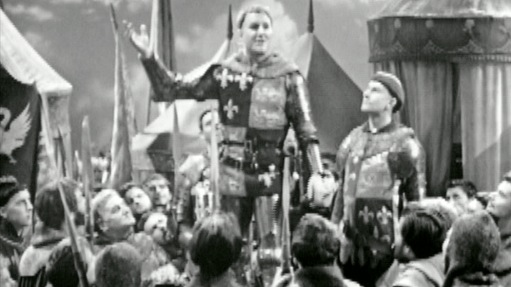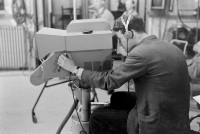
Each Saturday across eight weeks I am posting responses to the BBC cycle of Shakespeare’s History plays produced as An Age of Kings in 1960. Today’s post concerns the two episodes of Henry V, and was originally published here on 4 August 2009.
You’ll recall that we are working our way through the plays at a rate of one a week, viewing the episodes of An Age of Kings on the recent DVD release of the series that currently is only available as a Region 1 set in the United States. You hardly need me to confirm that Henry V is a great play, and in the series the production easily eclipses the two parts of Henry IV (considered here and here).
What do you need to know? Robert Hardy makes a splendid king, even if the battle scenes, staged in a cramped studio with two men and some broom handles, are inevitably compromised. Among the other highlights, along with the great speeches, is the appearance of a 26-year-old Judi Dench as Katharine of France. With all my usual caveats about complicity in the use of pirated material on YouTube, here’s a substantial extract featuring the two of them.
Particularly extraordinary (and not, as far as I can find, on YouTube) is Katharine’s scene with her gentlewoman Alice, in which the latter endeavours to teach the princess some basic English. As many schoolkids know, this builds to one of Shakespeare’s most outrageous dirty jokes — comparable indeed to ‘country matters’ — with the heavily accented use of ‘da foot, de cown’. I assume that Ms Dench (who here looks as if the proverbial butter wouldn’t melt…) was in on the joke of these puns on the French f— and c— words. I imagine that producer Peter Dews was also, but I doubt that the BBC mandarins were entirely aware.
More seriously, the cuts that the production makes in the text remove much of the ambiguity about the character of Henry. It’s possible to read the full play in such a way that the king emerges as mercilessly brutal, but not here. Robert Hardy is momentarily troubled by having to send Bardolf to his death but otherwise he’s as sympathetic and beneficent as a warlike monarch can be. Gone, for example, is this section of his threats before the gates of Harfleur:
The gates of mercy shall be all shut up
And the fleshed soldier, rough and hard of heart
In liberty of bloody hand shall range
With conscience wide as hell, mowing like grass
Your fresh fair virgins and your flow’ring infants.
William Squire is effective throughout as the Chorus, slipping in and out of the action. Early on, in the tennis balls scene, there is a single sustained shot, at different frame sizes, that lasts for 7 minutes and 30 seconds. At the end of this Chorus steps forward and the lighting behind him dips to obscure the change of scene. It’s a bravura moment of studio drama. And there’s much else here that’s very strong, like the gliding camera moving through the soldiers awaiting the dawn of the day of Agincourt. Indeed, this is definitely the best of the plays to date.
Producer Peter Dews had mounted Henry V for television three years before, again working with his director here Michael Hayes, and perhaps that’s why this production in particular is so confident. John Neville was his king then, and the success of that staging was a key factor in persuading the corporation’s bosses that the whole cycle should be mounted.
Dews left the BBC in the mid-1960s, directed the Birmingham Rep from 1966 to 1972, and worked out the remainder of his professional life in the theatre. I realise now that I saw his production on the London stage of Robert Bolt’s Vivat! Vivat Regina! in 1970. But what intrigues me most about his subsequent career is his production the previous year of a Hamlet featuring a immensely popular actor known primarily for his work in a television serial.
Richard Chamberlain was best known as Dr Kildare when Dews asked him to play the prince, and at first he was overawed by the prospect. But working closely with his director he found his way into the text.
My Hamlet will be totally different [he said just before the production opened]. It is a strange part in that you have to use yourself as much as you possibly can, finding whatever you can of Hamlet within you and magnifying it about ten thousand times.
When the production opened Chamberlain garnered more than respectful reviews and he went on to take the same role in an American television version of the play which was directed by Peter Wood. This is from a Time magazine article about the television production, which quotes a British stage reviewer (who I think was Michael Billington writing for the Guardian, and not The Times):
[Chamberlain] was the first American to dare Hamlet in Britain since John Barrymore, and, premiere night, a full cry of London critics rode to Birmingham for the kill —and for a shock. Wrote [T]he Times critic the next morning: ‘Anyone who comes to this production prepared to scoff at the sight of a popular American television actor playing Hamlet will be in for a deep disappointment.’
Part of my fascination with this of course relates to the parallels with ‘our’ Hamlet (which can only be taken so far) [‘our’ Hamlet refers to the Illuminations film of the RSC production directed by Gregory Doran, which was in production when this post was written], but I was also astonished to discover one other piece of trivia — although I don’t expect everyone to share my fascination with this.
The preparations were an astounding ordeal [Chamberlain said in a 1974 interview, which is transcribed here]. I began working with [Peter Dews] in New York, where he was directing Hadrian VII, and then I went back to his home in Whitstable, England, where I worked in a neighbour’s garage. You never heard such screaming, yelling and pounding! My problem was getting up sufficient power to carry the role. We Americans have no real vocal sustaining force. I learned from Dews the inner tension of the lines, the rhythm. I’ll be eternally grateful.
Whitstable, England! Where, in the winter of 1968 and the spring of 1969, your humble blogger was a 13-year-old boy struggling towards his O’ levels. How uncanny to think of Chamberlain and Dews working together on the Bard — and at full volume — in a garage just down the road.

Discussion
No comments yet.